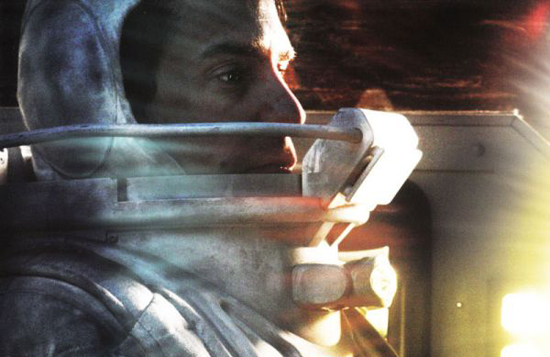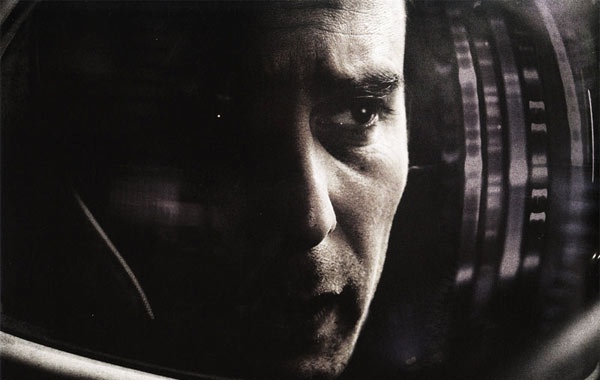Several months ago, teasers and gossip surrounding Duncan Jones’s debut feature Moon seemed to spring from nowhere. It was exciting because it didn’t have the gaudy whiff of ‘upcoming event movie’ and Hawaiian-shirted producers. It looked like an inventively produced, good-looking, modestly budgeted film making overt retro nods towards a whole clump of sci-fi classics of mostly 70s and 80s vintage. The concept was framed in starkly singular terms — it was a film about a man (Sam Rockwell) on the moon — however, despite the attractive simplicity of premise, details surrounding the actual conceit of the film’s narrative were left predominantly to speculation.
What was divulged in the marketing — and what’s fair to give away — is that Rockwell’s character Sam Bell, a solitary astronaut overseeing a lunar mining operation, encounters a double of himself after an accident. Has he gone loony with concussion or loneliness, or are there other causes for concern?
Moon has a lot going for it. It manages to satisfy on most of its promises and makes for a compelling watch that feels almost miraculously free of bullshit — a merciful distraction from the rumble of robots, towering IMAX, 3D glasses and all the froth about Avatar‘s impending splashdown from the planet OMG. "Space," as Charlton Heston once thoughtfully remarked, lowering his cigar, "squashes a man’s ego."
Here, Sam Rockwell deserves special praise (and a cigar) for his engrossing, increasingly splintered portrayals of Bell. Of course, claustrophobic sterile environs like the lunar base are fertile staging for someone bouncing off the walls. Still, the performance intensifies concisely with unfolding events, never deteriorating into muttering or hysteria. It must also have been a logistical nightmare to film. Jones and writer Nathan Parker deserve similar kudos for the skillful balancing of these elements, alongside editor Nicolas Gaster.
In terms of the elements, we go back aesthetically to the parallels in production technique and style with pre-nineties sci-fi. Here, Moon satisfies in the sense that despite the abundance of recognisable nods, they are just that and not winks — which is to say that the film never descends into pastiche, but represents more the ‘dynamic’, as Jones put it, that he saw as the best fit for his ideas and budget. Moon looks and sounds contemporary, its design seriously thought out and convincing; this appeared to be the case from the trailers but it’ss somehow a relief to see it borne out through the full 97 minutes.
You could probably take scissors to about half a dozen other sci-fi films and retell Moon with the scraps — but you wouldn’t have a substitute for Moon itself. It’s in this tug of war between familiarity and originality that the film, in this writer’s opinion, has its best triumphs and also falls slightly short.

Because of the inevitable bursts of nostalgia that Moon‘s format provokes (‘if you love films such as Silent Running . . .’), Jones has had to defend its distinctiveness. And he is fully vindicated in doing so. It is more than the sum of its hereditary ‘parts’ and worth seeing entirely on its own terms. It is — in its execution — intelligent, taut, compassionate and unsettling.
If there’s one problem it’s that the particular idea within this ‘idea film’ isn’t all that unfamiliar or mind blowing. One of the reasons it’s difficult to discuss plot is that just dropping in a couple of comparable film titles offhand could provide crippling spoilers. That’s by no means a crisis in itself; the problem is that by the very end we are left with the feeling that the film is there to serve that idea rather than the other way round. The film’s idea, in its way, becomes the climax of the film; the logic of the plot suddenly being relegated to a secondary status. This doesn’t kill Moon, but certainly leaves it with a couple of rankling loose ends and defuses slightly the overall impact.
Otherwise however, it’s excellent. On this evidence, it seems that there’s a lot to look forward to in the WW2 submarine thriller Escape from the Deep that Jones has scheduled for next year. Meanwhile, as we’re about to flip into whatever follows the noughties, we’re left to solemnly speculate whether the combined successes of Moon and WALL-E might spark off a new Hollywood retro trend for weightily themed lo-fi sci-fi movies. This would inevitably result in a hurricane of stodgily profound ecological mockumentaries featuring bearded men in rockets.



